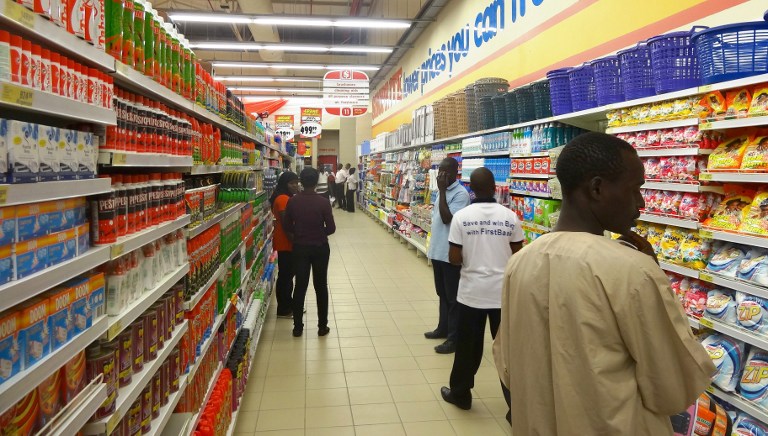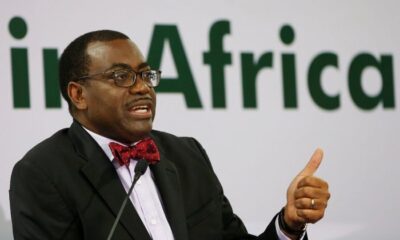Government
From Nigerian Economic Summit, a Path to Development
Published
8 years agoon

- From Nigerian Economic Summit, a Path to Development
The 22nd Nigerian Economic Summit (NES #22), organised by the Nigerian Economic Summit Group, in collaboration with the Ministry of Budget and National Planning, last week in Abuja, brought together, policy makers, investors, government functionaries and industry stakeholders to deliberate on the state of the Nigerian economy. This was with a view to facilitating stakeholders’ agreements on practical issues, opportunities, policies and regulations needed to achieve self-sufficiency and value-addition capacities for several products and services in the shortest possible time.
With the theme: ‘Made in Nigeria’ the three days summit was designed to conceptualise ‘Made In Nigeria’ as an economic growth and development strategy for short, medium and long-term development that would boost self-sufficiency and increase exports for foreign exchange earnings for Nigeria.
The essence of the summit was to reshape the thinking of government from over-dependence on crude oil, to a more diversified economy with several sources of income that would boost the country’s foreign exchange earnings.
Most economies that depend on commodities, especially crude oil for their national income, are going through major decline in their external earnings. But Nigeria has some peculiarities, given its import dependency and its huge consumption economy. This has led to negative economic growth, dwindling foreign reserves and mounting pressure on local currency exchange rate relative to major currencies.
The resulting social challenges include increasing unemployment, reducing income, pervasive poverty and a decline in funding public and social projects that would have benefitted the masses.
In order to address these challenges, the NES #22, discussed in details, issues that would put Nigeria on the right path of economic growth and development.
Some of the measures reached at the summit, include promoting production and consumption of ‘Made in Nigeria’ goods and services, while maintaining a trade balance between imports and exports and recognising the realities of globalisation. The summit believed that these would reinvigorate moribund industries and services that had shown potentials in the past and curtail the growing demand for foreign exchange for consumption rather than capital products and equipment.
Past Nigerian Economic Summits have made recommendations on self-sufficiency in local production and an export-driven economy, which were re-echoed at this year’s summit. These include macroeconomic environment issues like the ease of doing business; access to finance; infrastructure; quality and standards; technology and innovation; as well as job creation, skills acquisition and youth employment. All these were designed by the Nigerian Economic Summit Group to revamp the dwindling state of the Nigerian economy, which is currently passing through recession.
State of the Nigerian economy
Speaking on the state of the economy in his keynote presentation at the summit, Chairman, Nigerian Economic Summit Group (NESG) Board Committee on Research and Publication, Dr. Adedoyin Salami, said the current state of the Nigerian economy was in bad shape, but that it could be resuscitated if there was full support and patronage for Made in Nigeria goods and services, which was carefully selected as the theme of this year’s summit.
He went further to state that the ‘Made in Nigeria’ call was a call to create a productive and sustainable economy, and that the Nigerian economy needed to be productive, globally competitive, inclusive and must be able to add value to its citizens.
According to him, “Our economy is far from ideal but offers us opportunity to revitalise. The economy has shrunk in size, capital flows have been poor and generally, the Nigerian economy has been negatively impacted by the external environment, mainly the price of crude oil. On the domestic side, there have been absence of a development plan for strategic framework, low global competitiveness and poor ease of doing business.”
Current earnings statistics of the Nigerian economy are not ideal, as export earning was $97 billion in 2013, but this year, Nigeria will be lucky to earn $40 billion. This scenario presents an opportunity for us to revitalise the economy, Salami said.
He said more than 50 per cent of young people in Nigeria between 15 and 25 years were either unemployed or under-employed, which he said, was not good for economic growth.
Presidential Position
Declaring the 22nd Nigerian Economic Summit open, President Muhammadu Buhari reassured Nigerians of government’s commitment to diversify the economy, in order to make Nigeria less dependent on oil. “As I have said in the past, we need to diversify the economy so that we will never again have to rely on one commodity to survive as a country. So that we can produce the food we eat, make our own textiles, produce most of the things we use and create the right environment for our young to be able to benefit and create jobs through technology. This has been the commitment and mandate of this administration and I have remained focus on it since the assumption of this administration,” Buhari said.
The President added that there was clearly no better way to achieve this without building on economic foundation of ‘Made in Nigeria’ goods and services. Fortunately, we have champions of ‘Made in Nigeria’ goods and services that have defied the odds over the years to produce locally developed products and contribute to our economy, Buhari added.
“Initiative and incentives that will enhance ‘Made in Nigeria’ are already being put in place by this administration, and I encourage more local production, to improve the ease of doing business in our environment, transfer our technology and innovation capabilities, improve quality and standards, promote export and change our old attitude and behaviour,” Buhari said.
My greatest desire is to see Nigeria move from import dependence to self-sufficiency in local production and become an export-led economy in goods and services, the president said.
Vice President Yemi Osinbajo raised the hope of Nigerians, assuring them that the federal government was determined to revamp the economy through its policy implementation, designed to diversify the economy.
Osinbajo who spoke at the Policy Dialogue Forum on the state of the Nigerian economy, said there was need for government to inject more money into circulation to cushion the effect of the current recession, and that one of the ways through which government could achieve it, was to inject the expected N350 billion that was looted by past governments into the economy to fund budget planning and implementation.
“A good percentage of the stoen monies has been recovered, and we are still expecting about $400 million from the US and about $300 million from Switzerland. By the time all these monies are recovered, we will surely inject them into circulation to support budget funding,” Osinbajo said.
Disturbing Issues
The summit raised several issues militating against the growth of the Nigerian economy, among which, are the unfriendly business environment, high rate of unemployment, high interest rate on importation of equipment by investors, weak implementation of government policies, and the difficulties in accessing land by willing investors.
Stakeholders, especially investors who were present at the summit, complained of unfriendly business environment in Nigeria and called for quick government intervention.
Senate President Bukola Saraki noted that the enhancement of ease of doing business is very crucial. He talked about the initiative of the Senate known as the National Assembly Business Environment Roundtable (NASSBER) document, which seeks to address 11 key areas where laws governing business activities may need to be reviewed as a result of the country’s harsh business environment.
The Minister of Mines and Steel Development, Dr. Kayode Fayemi, who also spoke at the policy dialogue forum of the 22 Nigerian Economic Summit, revealed why Nigeria had not been successful in the areas of solid minerals and mining. According to him, the country has good policies for the mining sector, but lacks proper implementation of those policies that should drive the economy. While faulting the legal and regulatory environment of the mining sector, Fayemi said several people were involved in illegal mining in the country, noting that they see nothing wrong in it, since the mineral resources are located within their farmlands.
Although the summit identified some critical factors that impeded job creation in the past such as high interest rates, uneven distribution of fertilisers and lack of full implementation of some government policies, some investors like Aliko Dangote of Dangote Group and Jay Ireland of GE Africa, were however of the view that investment in agriculture, infrastructure and power were key factors that would open up job opportunities and job creation for the country.
According to Dangote, government must invest in agriculture, mining and manufacturing, including training, in order to give Nigerians the opportunity to acquire relevant skills that would make them employable. He said Dangote Group had set aside N15 billion for training of Nigerians in cement manufacturing, but expressed worries on the issue of land acquisition for business expansion.
Ogun State Governor, Ibikunke Amosun, said it was in the interest of government to create jobs for its citizens.
He said agriculture was the best option for Nigeria to engage its citizens in the area of job creation, and that the private sector must be involved in all of these. He said in Ogun State, government released N500 million, while banks released another N500 million to finance agriculture in the state.
Kebbi State Governor, Abubarka Atiku Bagudu, said the economic recession that Nigeria was passing through was an eye opener for government to diversify the economy and create more jobs for the people, instead of depending on oil.
Giving investment details in other regions, Dangote said in Algeria, investors have zero interest rate, zero taxation and in addition to that, the government of Algeria provides subsidies for investors that import necessary equipment for local production.
Osinbajo however said Nigeria had policies for duty waiver on agriculture and tax holidays for some sectors, but explained that the full implementation of the policies may be an issue for the country, which he said must be addressed without delay.
The Remedy
Suggesting possible ways to address Nigeria’s challenges, Salami said there was need to improve on the country’s economy and make it internally coherent. For the Made in Nigeria initiative to be successful, it is important to recognise global trends, identify the ones that are advantageous and disadvantageous and we must do away with the ones that are not beneficial, Salami added.
He outlined four areas that are critical success factors, which include building confidence in Nigerian policies through proper communication; articulating development plan; addressing issues of fiscal and monetary policies to complement each other; and making public procurement of ‘Made in Nigeria’ goods imperative.
Chairman, Signal Alliance, an Information Technology (IT), expert, who is member of the Lagos Angel Network, Mr, Collins Onuegbu, said the best way to develop local content in ICT is for government to invest in technology start-ups and make funds available for them to boost technology innovation and creativity. “Aside funding the start-ups, government must also consider giving tax rebate to investors who may have invested in start-ups that could not break even,” Onuegbu said.
He explained that one major drawback about investing in start-ups is that nine out of every 10 startups sponsored by Angel Investors or any other investor, may end up not being successful. He therefore said that government must begin to think of how to compensate investors by way of exempting them from taxes, until they recoup their investment on the failed startps. “If such palliatives are offered by government for investors who invest in technology startups, it will encourage them to invest more and create opportunity for growth in the ICT sector,” Onuegbu said.
Having identified and examined critical factors impeding Nigeria’s economic development, the summit concluded that the best time to address the country’s challenges is now, and called on the private sector to come out in their numbers to join government in putting Nigeria on the right economic path.
Is the CEO and Founder of Investors King Limited. He is a seasoned foreign exchange research analyst and a published author on Yahoo Finance, Business Insider, Nasdaq, Entrepreneur.com, Investorplace, and other prominent platforms. With over two decades of experience in global financial markets, Olukoya is well-recognized in the industry.

You may like
-
Nigeria Joins BRICS as Partner Country, Strengthening Global South Cooperation
-
70 Million Poorest of The Poor Nigerians To Get N75,000 From FG
-
Nigeria Surpasses OPEC Quota with 1.51 Million bpd, Targets 2.06 Million in 2025
-
Global Investors Commit $7.6 Billion to Nigeria’s Development at AIF 2024
-
Nigeria-China Trade Strengthened as Grimaldi Introduces Direct Shipping Line
-
Nigeria’s GDP Records 3.46% Growth in Q3 Spurred by Non-Oil Sector













